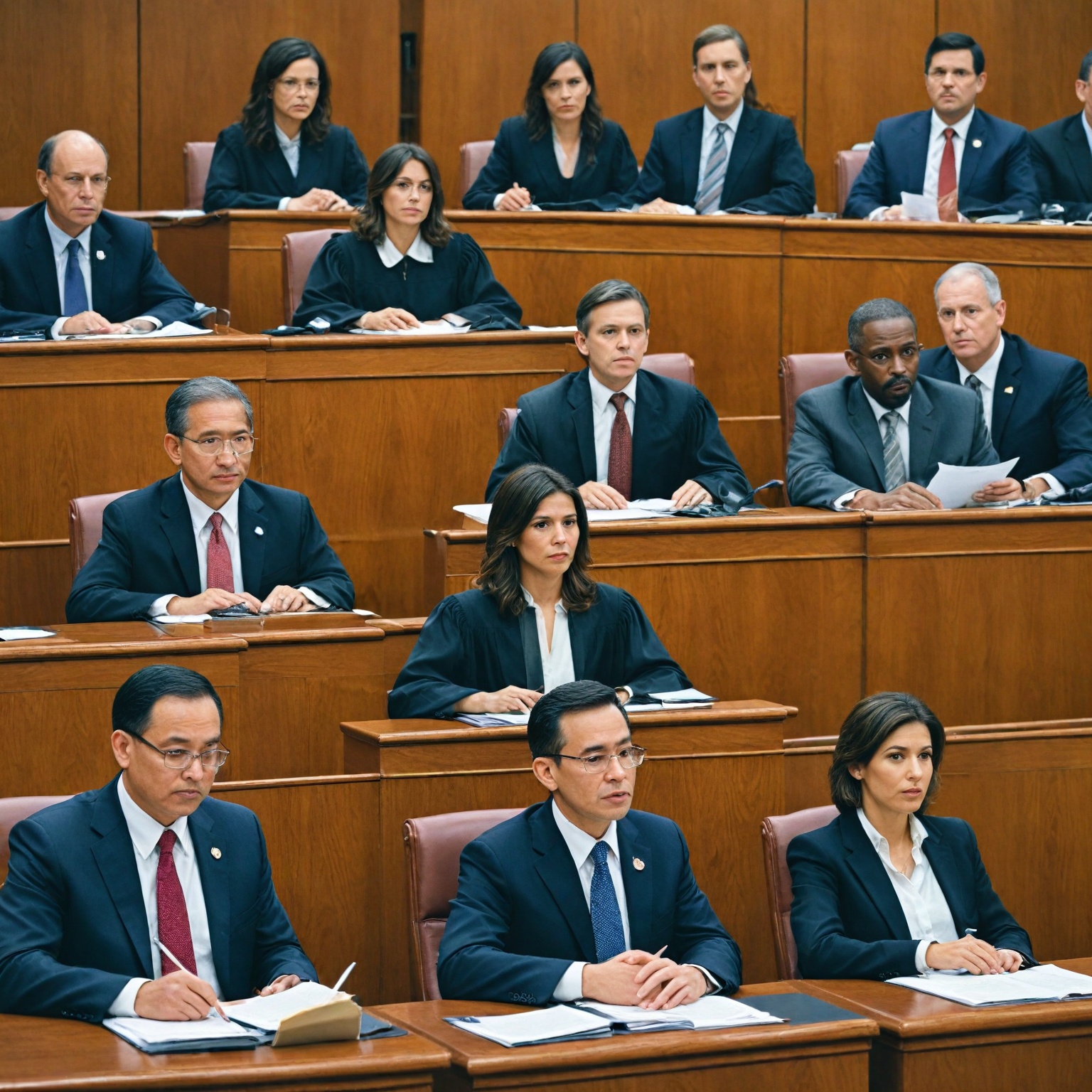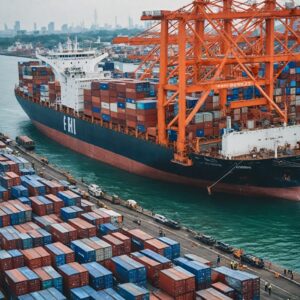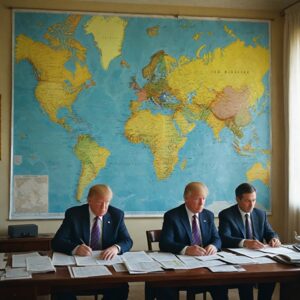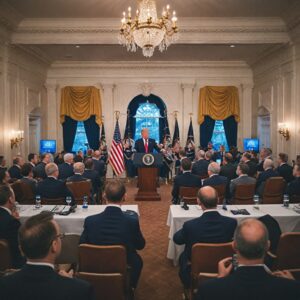Summary
The legal victory by U.S. District Judge Edward Chen in early 2025 marked a pivotal moment in the ongoing dispute over Temporary Protected Status (TPS) for Venezuelan nationals residing in the United States. The case arose after the Trump administration sought to terminate TPS protections for approximately 350,000 Venezuelans, a move that would have revoked their work permits and exposed them to deportation. Judge Chen’s nationwide injunction blocked the administration’s attempt to rescind TPS, citing substantial evidence that the decision was motivated, at least in part, by racial animus and violated both the Administrative Procedure Act and the Equal Protection Clause of the U.S. Constitution.
The controversy reflects broader tensions between executive immigration enforcement policies and judicial oversight. The Trump administration’s efforts to end TPS protections for Venezuelans were intertwined with its hardline immigration stance and a geopolitical strategy aimed at pressuring the Venezuelan government under Nicolás Maduro, especially given Venezuela’s economic ties to China. Additionally, the administration’s invocation of the rarely used Alien Enemies Act of 1798 to expedite deportations of certain Venezuelan immigrants further heightened legal scrutiny, with multiple courts ruling that such actions exceeded statutory authority and compromised procedural fairness.
Judge Chen’s ruling emphasized that the government failed to show any significant harm from maintaining TPS for Venezuelans while underscoring the “irreparable harm” that would befall the immigrant community if protections were abruptly terminated. The decision highlighted the judiciary’s role in checking executive actions when those actions appear arbitrary, capricious, or rooted in unconstitutional bias. Although the U.S. Supreme Court later granted an emergency stay allowing the administration to proceed temporarily with TPS rescission pending further appeals, the legal battle underscored ongoing conflicts over immigration policy, due process, and the limits of executive power.
This case has significant implications for U.S. immigration law and policy, illustrating the precarious status of TPS beneficiaries and the judiciary’s growing influence amid a polarized political environment. It also reflects broader debates about the use of immigration enforcement as a tool of foreign policy and the necessity of safeguarding constitutional protections against discriminatory government actions.
Background
The legal battle over the status of thousands of Venezuelan immigrants in the United States stems from a series of policy shifts initiated under both the Trump and Biden administrations. In response to political instability and humanitarian crises in Venezuela, the Biden administration designated Venezuelans eligible for Temporary Protected Status (TPS) in 2021 and extended these protections through 2026. TPS is a federal immigration program established in 1990 to offer relief to nationals of countries experiencing war, natural disasters, or other extraordinary conditions, allowing beneficiaries to live and work legally in the U.S. for a limited period.
However, the Trump administration, consistent with its broader approach to limit immigration protections, sought to rescind these TPS designations for Venezuelans. In early 2023, the administration revoked an 18-month extension of TPS for Venezuelans that had been granted under the Biden administration and moved to terminate the designation for an estimated 350,000 Venezuelans covered by the 2023 TPS designation. This action threatened to remove work permits and deportation protections for these individuals within months of the announcement. Meanwhile, another group of approximately 250,000 Venezuelans granted TPS in 2021 remained protected until at least September 2025 but also faced uncertainty under the Trump plan.
A notable aspect of the Trump administration’s approach was the invocation of the Alien Enemies Act of 1798, a rarely used statute, to accelerate deportations of certain Venezuelan immigrants. This included labeling the Venezuelan gang Tren de Aragua as an imminent threat, thereby bypassing standard immigration procedures to fast-track removals. Federal judges in multiple jurisdictions challenged this use of the Alien Enemies Act, citing concerns over procedural fairness and the scope of executive power, resulting in temporary blocks on deportations.
The move to terminate TPS protections was also legally contested on grounds of racial discrimination. U.S. District Judge Edward Chen criticized Homeland Security Secretary Kristi Noem’s decision to end TPS protections as rooted in sweeping negative generalizations about Venezuelan immigrants, describing the action as a “classic example of racism.” Judge Chen’s 78-page ruling halted the termination of TPS protections nationwide, emphasizing that the decision appeared to be motivated by racial animus and was legally flawed.
Underlying these immigration policy disputes are broader geopolitical considerations. The U.S. government’s efforts to pressure the Venezuelan regime, led by Nicolás Maduro, align with longstanding bipartisan aims to promote regime change and counter Venezuela’s economic ties to China. The Trump administration’s aggressive immigration measures against Venezuelans have been viewed as part of this larger strategy to destabilize the Maduro government and support opposition forces aligned with Washington.
Together, these factors created a contentious legal and political environment surrounding the status of Venezuelan immigrants, culminating in the judicial rulings that temporarily blocked the Trump administration’s attempts to void their TPS protections and halt deportations.
Legal Challenge to TPS Rescission
In February, a group of Venezuelan Temporary Protected Status (TPS) beneficiaries along with the National TPS Alliance filed a lawsuit challenging South Dakota Governor Kristi Noem’s decision to end TPS protections for Venezuelans residing in the United States. The lawsuit argued that Noem’s move violated administrative procedures and was motivated by racial animus, citing derogatory and false statements made by Noem and former President Trump targeting Venezuelans as criminals. Plaintiffs contended that these actions were unlawful and sought to prevent the termination of TPS status, which protects approximately 348,202 Venezuelans registered under the Biden administration’s 2023 TPS designation.
U.S. District Judge Edward Chen granted a nationwide injunction that blocked the termination determination, ruling in favor of the plaintiffs. Judge Chen found the government’s arguments, which claimed broad authority granted by Congress to the Secretary of Homeland Security and asserted that judicial review was precluded, to be unpersuasive. He emphasized that the government failed to demonstrate any real harm from continuing the TPS program for Venezuelans and highlighted concerns over the racial bias implicated in the rescission decision.
The Trump administration responded by seeking emergency relief from the U.S. Supreme Court after the injunction prevented the planned TPS termination set for April 7. The Supreme Court initially allowed the administration to proceed with ending TPS protections for roughly 350,000 Venezuelans pending appeal, thereby paving the way for possible deportations. However, the Supreme Court’s order left some ambiguity regarding whether affected immigrants could mount further legal challenges to restore work authorization extensions previously granted until October of the following year.
Throughout the legal proceedings, the National TPS Alliance and individual Venezuelans maintained that the administration’s attempt to rescind TPS was an effort to evade judicial scrutiny and undermine the rule of law. Their lawyers asserted the fundamental principle that federal courts have the authority to interpret and enforce the law, including immigration protections. The case underscored the ongoing tension between executive immigration enforcement and judicial oversight, particularly in the context of procedural due process and protections against discriminatory government actions.
On May 19, 2025, the U.S. Supreme Court issued a decisive 8-1 ruling granting the government’s emergency stay of Judge Chen’s injunction, effectively allowing the administration’s rescission efforts to move forward pending further proceedings. This ruling marked a significant moment in the protracted legal battle over the status and protections of Venezuelan TPS recipients in the United States.
Judicial Proceedings and Decisions
In early 2025, the Trump administration sought to terminate Temporary Protected Status (TPS) for nearly 350,000 Venezuelans, a move met with immediate legal challenges. The National TPS Alliance, alongside individual Venezuelan TPS holders, filed lawsuits contesting the administration’s decision, arguing that it was motivated by racial animus and violated federal law. California-based U.S. District Judge Edward Chen played a central role in these proceedings, issuing a nationwide injunction blocking the administration’s attempt to rescind TPS for Venezuelans just one week before the protections were set to expire.
Judge Chen ruled that the rescission violated the Administrative Procedure Act (APA) and the Equal Protection Clause of the Fourteenth Amendment, highlighting that the administration’s characterization of the Venezuelan TPS population as criminals was “baseless and smacks of racism”. Chen further found that derogatory and unfounded statements made by Secretary Kristi Noem and former President Trump against Venezuelans indicated racial animus as a motivating factor in ending the protections. Despite the government’s contention that the Secretary of Homeland Security had broad, unreviewable authority under Congress’s plenary power over immigration matters, Chen rejected these claims, emphasizing the judiciary’s role in reviewing executive actions for legality.
Following Judge Chen’s injunction, the Trump administration filed an emergency application to the U.S. Supreme Court to lift the block on ending TPS. The Supreme Court granted the emergency stay, allowing the administration to move forward with its policy reversal while litigation continued in the lower courts. The Supreme Court’s order was issued without detailed explanation, but liberal Justice Ketanji Brown Jackson dissented from the majority’s decision. The Court’s order indicated that Venezuelan migrants who had already been issued work permits or documentation extending their status under the Biden administration might still seek relief.
Parallel to the TPS litigation, other judicial actions also constrained the administration’s hardline immigration policies targeting Venezuelans. For instance, a Texas federal judge ruled that the Trump administration exceeded its authority by invoking the Alien Enemies Act of 1798 to accelerate deportations of alleged members of the Venezuelan gang Tren de Aragua, which the government labeled a terrorist organization. Courts across several states temporarily blocked deportations under this act, requiring the government to provide migrants with reasonable notice and opportunity to challenge their removal. This judicial pushback underscored the judiciary’s critical role in maintaining procedural protections and scrutinizing executive overreach in immigration enforcement.
Judge Edward Chen’s Ruling
In early 2025, California-based U.S. District Judge Edward Chen issued a pivotal ruling blocking the Trump administration’s attempt to rescind Temporary Protected Status (TPS) for approximately 350,000 Venezuelans, a move that would have resulted in the loss of work permits and deportation protections for those immigrants. Chen’s decision centered on concerns that the revocation was partially motivated by racial animus, citing numerous derogatory and false statements made by then-Governor Kristi Noem and former President Trump targeting Venezuelans as criminals. He found the government’s arguments unpersuasive and noted that the administration had failed to demonstrate any “real countervailing harm” that would justify ending TPS for Venezuelan beneficiaries.
Chen described Noem’s actions as likely “unauthorized by law, arbitrary and capricious, and motivated by unconstitutional animus,” emphasizing that the affected immigrants faced “possible imminent deportation” if the rescission were allowed to proceed. The judge’s injunction temporarily halted the planned expiration of protections set under a 2023 TPS designation, which had been initially scheduled to last until October 2026 but was challenged for early termination in 2025.
The ruling underscored the judicial branch’s role in overseeing executive actions, with Chen asserting that the courts have the authority to review whether administrative decisions comply with legal standards and constitutional protections. The Trump administration, through Solicitor General D. John Sauer, had argued that Noem’s decisions were committed to the discretion of the executive branch and thus not subject to judicial review; however, Chen’s ruling rejected this claim. The case highlighted tensions between executive immigration policy flexibility and the judiciary’s duty to guard against discriminatory and unlawful administrative actions.
While the Supreme Court later granted an emergency stay lifting Chen’s injunction in May 2025, allowing the government to proceed with the termination of TPS protections pending ongoing litigation, Justice Ketanji Brown Jackson dissented, reflecting continued judicial disagreement over the matter. The Supreme Court’s order also suggested that Venezuelans who had already received documentation extending their legal status under prior Biden administration TPS designations might have grounds for further legal challenges.
Chen’s ruling remains a significant legal victory for immigrant advocacy groups and Venezuelan TPS holders, reaffirming the judiciary’s capacity to check executive decisions perceived as unlawful or motivated by unconstitutional bias. It also marked a notable judicial rebuke of the Trump administration’s hard-line immigration policies, occurring alongside other Supreme Court decisions limiting aspects of that agenda.
Comparison to Previous Legal Precedents
The legal victory achieved by U.S. District Judge Edward Chen in blocking the Trump administration’s attempt to terminate protections for approximately 350,000 Venezuelan nationals under the Temporary Protected Status (TPS) program fits within a broader context of judicial scrutiny over immigration policies and executive authority. Historically, the Supreme Court has recognized Congress’s plenary power over immigration, granting it near-complete authority to regulate the admission and removal of noncitizens, including exclusions based on ethnicity, gender, legitimacy, and political belief. This plenary power has often limited judicial interference in immigration enforcement decisions.
However, courts have also repeatedly emphasized that the Executive Branch must adhere to procedural safeguards, such as due process, even when implementing immigration policies. In this case, Judge Chen found the administration’s decision to terminate TPS protections for Venezuelans was motivated, at least in part, by racial animus, a finding that resonates with previous rulings where courts have struck down executive actions tainted by discriminatory intent. This approach aligns with judicial efforts to ensure that executive discretion in immigration enforcement does not violate constitutional protections or statutory safeguards.
Moreover, the ruling echoes prior challenges to the administration’s expansive use of laws and policies. For instance, courts have blocked rapid deportations under the Alien Enemies Act, citing overreach beyond statutory authority and insufficient procedural protections for detainees. Similarly, multiple courts have resisted executive attempts to shield immigration enforcement decisions from judicial review, reaffirming the judiciary’s role in interpreting the scope of executive power and protecting individuals’ rights.
The Supreme Court has also clarified limits on states’ ability to challenge federal enforcement priorities, upholding the executive branch’s discretion to focus immigration enforcement resources on particular categories of noncitizens, such as those deemed threats to public safety or national security. However, this deference does not extend to decisions that may be founded on unconstitutional motives or that circumvent procedural protections, as was alleged in the case blocking the termination of TPS for Venezuelans.
Reactions and Responses
The decision by the U.S. judge to block the Trump administration’s attempt to void documents affecting approximately 350,000 Venezuelans elicited a range of responses from legal experts, advocates, and political observers. Ahilan Arulanantham, one of the lawyers involved in challenging the cancellation of Temporary Protected Status (TPS) for Venezuelans, highlighted the uncertainty surrounding the immediate effects of the ruling but emphasized the potential widespread harm the government’s action could cause. He pointed out that the decision threatened to inflict “irreparable harm on hundreds of thousands of persons whose lives, families, and livelihoods will be severely disrupted,” in addition to imposing substantial economic costs and public health risks across U.S. communities.
Similarly, U.S. District Judge Chen underscored in his ruling that the government’s action endangered the well-being of hundreds of thousands of Venezuelan beneficiaries, while the government failed to demonstrate any significant harm from continuing TPS protections. Chen further criticized the administration’s move as likely unauthorized by law, arbitrary, capricious, and driven by unconstitutional animus. These judicial observations reinforced the perception that the Trump administration’s policy was not only legally questionable but also deeply harmful to the immigrant community involved.
The political context surrounding the administration’s decision also drew scrutiny. Analysts noted that the targeting of Venezuelan immigrants was consistent with broader efforts by the Trump administration to pressure the Maduro regime in Venezuela as part of a strategy aimed at regime change. This approach was supported across the U.S. political spectrum and was intertwined with Washington’s geostrategic competition with China, given Venezuela’s economic ties to Beijing. Critics argued that the administration’s punitive immigration measures sought not only to destabilize Venezuelan communities in the U.S. but also to bolster far-right factions in Venezuela aligned with U.S. interests.
Public response included demonstrations in support of reinstating TPS for Venezuelans, notably in Miami, where protesters rallied against the revocation of protections
Broader Implications
The judicial blocking of the Trump administration’s attempt to terminate Temporary Protected Status (TPS) for Venezuelan nationals carries significant implications for U.S. immigration policy and enforcement. This decision highlights the growing influence of the federal judiciary in shaping immigration policy, particularly as Congress has remained largely inactive on comprehensive immigration reform. Since the Obama administration, lawsuits challenging immigration policy have proliferated, granting federal judges considerable authority to affect national policy decisions.
The ruling underscores the judiciary’s role in upholding procedural safeguards such as due process, preventing executive actions perceived as arbitrary or motivated by racial animus. Judge Edward M. Chen’s opinion emphasized the potential irreparable harm to hundreds of thousands of immigrants and their families, including economic and public health consequences for U.S. communities. The court found the government failed to demonstrate any significant harm in continuing TPS protections, effectively reinforcing judicial oversight over executive discretion in immigration enforcement.
This case also illustrates the precarious legal and social position of TPS beneficiaries, who exist in a “liminal status” without clear pathways to permanent residency. The possibility of non-renewal of TPS designations remains a persistent threat, as seen during the Trump administration’s attempts to end TPS for various nationalities, including Haitians and Salvadorans. The extended designations, sometimes lasting decades, have sparked criticism that TPS has been used beyond its original intent as temporary relief, complicating debates over immigration policy priorities.
Furthermore, the targeted nature of these immigration rollbacks reflects broader geopolitical considerations. The Trump administration’s focus on Venezuelan migrants was intertwined with U.S. efforts to exert pressure on regimes with close ties to China, linking immigration enforcement to foreign policy objectives. Simultaneously, other immigrant groups, such as Haitian nationals, have faced similar threats of deportation due to scaled-back TPS extensions, indicating a wider pattern of restrictive immigration measures under the Trump administration, many of which are subject to ongoing legal challenges.
The decision also reinforces the constitutional principle of separation of powers, emphasizing that while the executive branch retains discretion in enforcement priorities, its actions must still align with judicial standards and legislative frameworks. Legal experts have noted that courts generally avoid interfering with immigration enforcement discretion unless fundamental legal principles are at stake, as reaffirmed by the American Immigration Council.

























